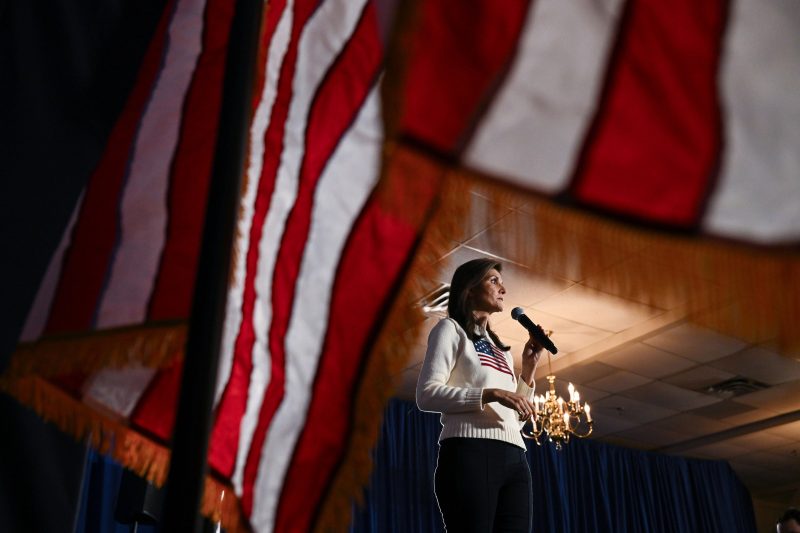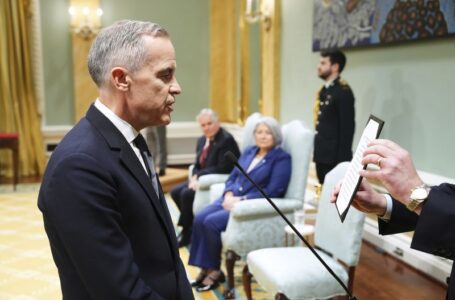Mark Carney sworn in as Canada’s PM after Trudeau steps down
The impossibility of beating Trump in the GOP — in one Nikki Haley poll


For as long as Republicans have been running against Donald Trump in the 2024 GOP presidential nominating contest, more than a few Trump critics have wondered why they don’t go after him harder.
Nikki Haley shows why.
A new Washington Post-Monmouth University poll features a somewhat unsurprising top-line number: Trump leads Haley by 26 points, 58 percent to 32 percent, in South Carolina.
But within the poll is a remarkable finding. Not only don’t Haley’s home-state GOP primary voters want to elect her as president, they don’t even seem to like her much anymore.
Haley was a popular governor of South Carolina, with polls generally showing about 8 in 10 Republicans approved of her. Polls of the GOP primary electorate in September and November showed her popularity was holding up pretty well.
Now that she is Trump’s lone remaining obstacle — and as she has stepped up her criticisms of him to include things like his mental sharpness — Republicans have far less regard for her.
The Post-Monmouth poll shows her home state’s GOP primary voters are now split on her, with 45 percent having a favorable opinion and 41 percent having an unfavorable one. (A Quinnipiac University poll this week showed Republicans nationally were similarly split.)
Since the same Post-Monmouth South Carolina poll was conduced in September:
Haley’s favorable rating among “strong” Republicans has plunged from 43 points positive (65-22) to 10 points negative (38-48).Among MAGA supporters, she has gone from plus-26 (56-30) to minus-32 (26-58).While 52 percent of Trump voters liked her in September, she is down to 22 percent.
It’s one thing for Haley to overwhelmingly rely on independent voters in these GOP primaries — a setup that makes winning a Republican nomination virtually impossible, since independents often can’t vote in these contests and are a distinct minority when they can. It’s quite another for the Republicans to turn against you personally.
It’s the kind of thing that suggests you won’t have much of a future in the party even beyond the 2024 nominating contest.
This is a familiar tale by now. Trump’s strongest GOP critics will often see their image numbers among Republicans crater, and they’ll often soon head for the exits. Think: John McCain, Bob Corker, Jeff Flake, Mitt Romney, Liz Cheney. Many of them wound up more popular among Democrats than Republicans.
Haley has not targeted Trump nearly as hard as these Republicans — she has been reluctant to engage on Trump’s legal problems, for instance — but she has still paid a distinct price, apparently by virtue of standing in his way and being increasingly critical.
And significantly, this is among the voters who Haley assured us just last week, after the New Hampshire primary, know her best and wouldn’t fall for Trump’s attacks.
“The great people of South Carolina know I cut their taxes,” Haley assured. “They know I signed the toughest illegal immigration bill in the country. They know we passed voter ID and tort reform and ethics reform. And they know we moved 35,000 people from welfare to work. Every time I’ve run for office in South Carolina, I’ve beaten the political establishment.”
Haley’s political decline within the GOP is particularly notable given that she once demonstrated an unusual knack for navigating the Trump era.
She removed the Confederate flag from the South Carolina State House grounds and, as Trump’s U.N. ambassador, occasionally distanced herself from Trump and his White House — all without alienating the right. She was popular among both Republicans and Democrats in her ambassador’s role.
If there was someone who might theoretically have been able to appeal to Republicans who weren’t sold on Trump, as well as more middle-of-the road voters, there was a good argument she was that candidate.
But that’s not how it’s turning out.
And the fact that she apparently can’t even do it in her home state speaks volumes.











